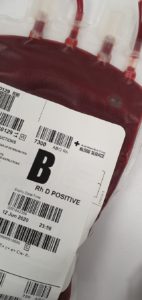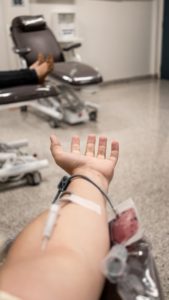 A recent experience brought the importance of blood donation into sharp focus for me. A dear friend called me in desperate need of blood. Her son, who has type B blood, was in the hospital, and there was a shortage of this specific blood type. Seeing my friend’s anguish and the urgency of the situation, I rushed to the hospital to donate blood, even though it was a Saturday morning.
A recent experience brought the importance of blood donation into sharp focus for me. A dear friend called me in desperate need of blood. Her son, who has type B blood, was in the hospital, and there was a shortage of this specific blood type. Seeing my friend’s anguish and the urgency of the situation, I rushed to the hospital to donate blood, even though it was a Saturday morning.
Although the mobile team was mobilised to the assigned places, I saw people from all walks of life, with different backgrounds and beliefs, coming together to donate blood. That day, I witnessed the power of community and compassion. Each person’s contribution was a small but integral part of a larger effort to save a life. It served as a poignant reminder that our shared humanity transcends our differences.
In the fast-paced world we live in, it’s easy to overlook the simple yet profound act of blood donation. Today, I want to shed light on the importance of blood donation and share a recent experience that brought its significance to the forefront of my own life.
The Blood We All Share
Blood, often referred to as the “river of life,” plays a crucial role in maintaining our health. It carries oxygen and essential nutrients to every cell in our bodies, helps remove waste products, and ensures the proper functioning of our organs. This vital fluid knows no bounds of race, age, or gender; it unites us all. It’s also something we tend to take for granted until a loved one’s life depends on it.
The Gift That Saves Lives
Blood donation is an act of profound generosity. When you donate blood, you’re giving someone a chance at life. It’s a gift that can’t be manufactured or bought; it can only come from the kindness of strangers, friends, and neighbours. As blood can be separated into three main parts, i.e., red blood cells, plasma, and platelets, a single donation can save up to three lives, and those lives may include children, accident victims, cancer patients, and many others facing critical medical conditions.
Why You Should Donate Blood
 You may be wondering why you, too, should consider donating blood. Here are some compelling reasons:
You may be wondering why you, too, should consider donating blood. Here are some compelling reasons:
It Saves Lives: Your donation can directly impact the survival and recovery of patients in need.
Medical Emergencies: Accidents, surgeries, and medical treatments often require significant amounts of blood. Your donation can ensure a steady supply.
Blood Disorders: People with conditions like sickle cell anemia and thalassemia rely on regular blood transfusions to lead healthier lives.
Cancer Patients: Cancer treatments can lead to a decreased blood cell count. Donated blood helps maintain their strength during this challenging time.
Pregnancy and Childbirth: Complications during pregnancy and childbirth sometimes necessitate blood transfusions to protect the lives of both mothers and infants.
Community Support: Donating blood is a powerful way to give back to your community and support those in need.
The Simple Act of Giving
Donating blood is a straightforward process, and the actual donation typically takes less than an hour. The blood you give will be tested, processed, and distributed to hospitals where it’s needed most. To find a blood donation center near you or a blood drive in your community, you can visit your local Red Cross or blood donation organization’s website.
Conclusion
My recent experience underscored the critical importance of blood donation. It’s a selfless act that can truly make the difference between life and death for someone in need. Donating blood is a valuable service that can help save lives, whether it is done in response to an unexpected situation or as part of a regular routine.
So, the next time you see a blood donation drive in your community, consider rolling up your sleeve and joining in. Remember that each drop of blood you donate is a gift of life. It’s a small act that can have an immeasurable impact, not only on the recipients but also on your own sense of purpose and connection to the world around you.
Let us continue to share the gift of life, one drop at a time, and make our communities healthier, safer, and more compassionate places to live.
This article is written by Dr Helmy Hazmi. He is a community medicine specialist with a specialization in Epidemiology and Biostatistics.
